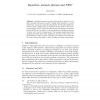Free Online Productivity Tools
i2Speak
i2Symbol
i2OCR
iTex2Img
iWeb2Print
iWeb2Shot
i2Type
iPdf2Split
iPdf2Merge
i2Bopomofo
i2Arabic
i2Style
i2Image
i2PDF
iLatex2Rtf
Sci2ools
AMSTERDAM
2009
2009
Equatives, Measure Phrases and NPIs
Standard semantic accounts of the equative ascribe it an `at least' meaning, deriving an `exactly' reading when necessary via scalar implicature. I argue for a particular formulation of this scalar implicature account which considers that (i) equatives license NPIs in their internal arguments, and (ii) equatives whose internal arguments are measure phrases (MPs) are, in contrast to clausal equatives, ambiguous between `at most' and `exactly' interpretations. The analysis employs particular assumptions about MPs, scalar implicature and the notion of set complementation to enable `at least' readings to be sensitive to the direction of a scale, thereby becoming `at most' readings in certain constructions.
AMSTERDAM 2009 | Implicature | Internal Arguments | Logical Reasoning | Standard Semantic Accounts |
| Added | 16 Feb 2011 |
| Updated | 16 Feb 2011 |
| Type | Journal |
| Year | 2009 |
| Where | AMSTERDAM |
| Authors | Jessica Rett |
Comments (0)

